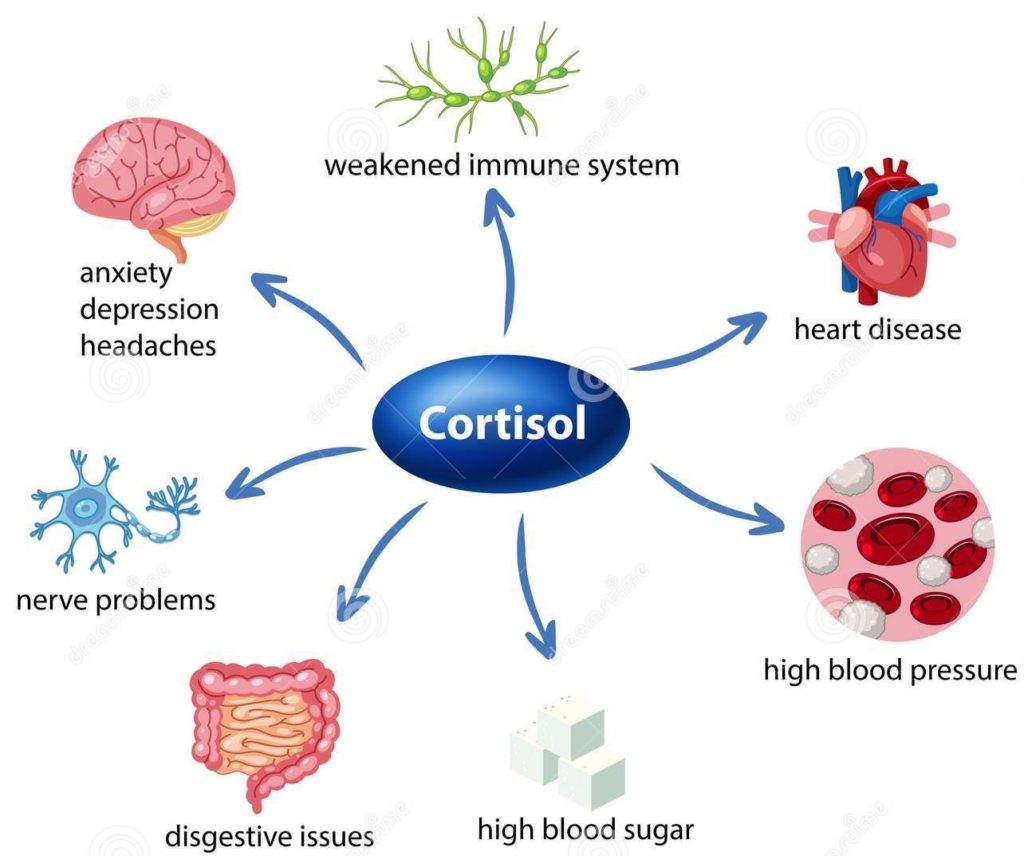Everyone experiences some type of stress during their life. *Flash to the Coronavirus outbreak and mandatory quarantine currently happening* But, what if that stress decides to hang around for WAY too long? One of the outcomes is weight gain, and it is directly related to your physiology and how you cope with stress.
Let’s look at some of the main ways stress causes weight gain.
Cortisol Levels
Cortisol is a steroid hormone produced in the adrenal glands. Cortisol is known as the stress hormone, and is released when triggered by the brain in response to different types of stress. When faced with a stressful situation, your adrenal glands produce adrenaline and cortisol which make up what is known as the “fight or flight response”. During this response, cortisol increases glucose in the bloodstream and enhances your brain’s use of glucose. Cortisol also “turns off” functions that would be nonessential in a fight-or-flight situation. “It alters immune system responses and suppresses the digestive system, the reproductive system and growth processes. This complex natural alarm system also communicates with the brain regions that control mood, motivation and fear.”
The Fight-or-Flight response is often short lived, and your body returns to normal after the stress is gone. If stress remains present for extended periods of time, bodily processes can be heavily disrupted.

Levels of cortisol, will remain high in this extended tension-filled time. This can begin a pattern of overeating. Overeating becomes present because increased levels of the hormone also cause higher insulin levels, your blood sugar drops and appetite is increased. This increase in appetite more often than not, makes you crave sugary, fatty foods.
Stress/Emotional Eating
You’ve no doubt heard the term “stress eating” before. Stress/Emotional eating are a huge culprit when it comes to weight gain. Eating caused by emotion is basically your way of “making it okay” to break your nutritional goals. The emotional response you have to a situation gives you the go-ahead to eat, because you are feeling some type of way.
“I am so sad, so I deserve this cake to make me feel happy again.”, “I had a hard day of work, so I deserve this bottle of wine.”
Sound familiar? It’s because the vast majority of us do this whenever we experience a situation that is “not ideal”. Besides creating a free-pass to eat or drink whatever you want, extreme stress can also affect your hormones and cause cravings that go along with emotional eating.
Distress placed on an individual increases the intake of food high in fat and/or sugar. High cortisol levels, as discussed above, in combination with high insulin levels are to blame. “Once ingested, fat- and sugar-filled foods seem to have a feedback effect that dampens stress related responses and emotions.” This is where the term “comfort” foods comes from, in that they seem to counteract stress. This may contribute to people’s stress-induced craving for those foods.
Sleep Disruption
We all know that sleep is important, but could your lack of sleep be causing weight gain? Yes, it sure can. When you are sleep deprived, you metabolism is affected negatively, which contributes to weight gain. Sleep duration directly affects the hormones regulating hunger– ghrelin and leptin.
With more go, less stop, and a slow metabolism…it’s easy to sleep how sleep deprivation can cause weight gain!
Another way sleep deprivation causes weight gain is directly related to energy levels. If you are sleeping 4 hours per night, it’s likely you will not have the energy for a solid gym session. It’s more likely that you will use this sluggishness as an excuse to stay home and relax by, you guessed it, eating food. Ahh, yet another reason to get a good night of sleep.
How to Combat Stress-Related Weight Gain
- Recognize the warning signs of stress and anxiety
- Before eating, ask yourself why you’re eating– are you truly hungry? Or is it because of an emotional response?
- Identify what your “comfort foods” are and keep them out of the house
- Exercise as a form of stress release.
- Practice relaxation skills
- Find a social support network. Contact loved ones when extreme stress is present. Have a group who supports you and wants the best for your long term goals.
- Get adequate sleep. Use breathing or meditation techniques to start the relaxation process.
- Have your meals planned. Do not skip meals, as this will lead to increased hunger and desire to eat unhealthy foods.
